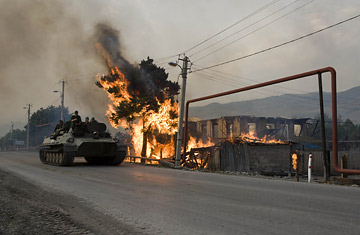
A Russian APC rides passing a Georgian house, set on fire by South Ossetian militia, burns in the Georgian village of Kvemo-Achebeti near Tskinvali, the capital city of the South Ossetia
Even as Russian tanks began their desultory withdrawal from Georgia on Tuesday, dozens of houses were still burning in Georgian villages north of Tskhinvali, the capital of the Georgian breakaway republic of South Ossetia. Many Ossetians appear keen to assure that the displacement of ethnic Georgians from the region becomes permanent.
In the course of the past two weeks, more than 90% of the houses in these villages, which lie in the broad, fir-covered mountain valley running up from Tskhinvali to the Russian border, have been looted and burnt. Looters from as far away as Chechnya and Abkhazia were seen hauling away TVs, refrigerators and other household appliances on the back of tractors and in the overloaded trunks of new cars — many of them stolen from the villages, according to local accounts.
This week, after a brief pause, the fires have started again. Over the last three days, a majority of the remaining houses in the villages of Kekhvi, Nizhnie Achaveti, Verkhnie Achaveti and Tamarasheni, have been burned while new fires were started in the smaller surrounding Georgian villages off the main road. On Tuesday a backhoe was used by South Ossetian villagers to tear down courtyard walls and rip into the sides of houses. Men wearing camouflage outfits and white Nikes, along with some in civilian clothes, stood around on the main road as the backhoe took a swipe at an above ground gas or water pipe.
The backhoe's work could be seen along a six-mile (10 km) stretch of the road from Tskhinvali to the Russian border. Gates and fences had been smashed down and piping bent into a crazy zig-zag.
"They did this because they don't want us to come back," said Iosif Zadashvili, a resident of Kurta, which lies off the main road. The white-haired man sat dazed in the Georgian town of Gori on a chair made for a child, his lower lip trembling, as he related how Russian soldiers had stood by while Ossetian irregulars beat him in the courtyard of his home, knocking out all of his lower front teeth.
While Russian troops control checkpoints around the edge of Tskhinvali, locals and men from North Ossetia are now making a concerted effort to raze the Georgian areas just north of the town.
Earlier in the week, officials from the Russian Ministry of Emergency Services cleared the Georgian villages of old men and women who had stayed behind to protect property and livestock. They were brought to the Georgian city of Gori, which is still controlled by the Russian army. The grandmothers and grandfathers told of Ossetian irregulars from both north and south of the Russian border coming into their villages and threatening to kill them.
"They kill there. We won't return," said Kalistina Gelashvili, 82, of Kurta. "I stayed to defend our house. They destroyed everything.They burned our house and killed and stole our cattle." She was speaking at Kindergarten No. 2 in Gori, where the Ministry of Emergency Services had deposited her and a group of around 40 elderly. Other villagers were more optimistic. "I'll return if there is peace," said Izoldya Menadiyashvili, 70. "I want to return."
She won't likely have any easy time of it. Local news reports in Tskhinvali contend that Georgian special forces were burning Georgian villages to create the impression that Russian forces were allowing ethnic cleansing. "The Georgians destroyed everything," said Alan Khosayev, 28, as he watched workers clear a destroyed Georgian tank from an intersection in Tskhinvali. "Now we'll have to rebuild it. I don't know where the money will come from to rebuild South Ossetia. Probably from Russia." Certainly the Russian forces are broadly seen as saviors among the Ossetians: graffiti on the side of one building read, "Thank you Russia!"
On that firm footing, a representative from Russia's Federal Prosecutor's Office, speaking at the expanding Ministry of Emergency Services base at Tskhinvali's Repubican Hospital, said his office was searching for indisputable proof of Georgian military aggression against Russian peacekeepers during Georgia's initial attack of South Ossetia.
He said that his office was still in the beginning stages of the investigation, but that Russia would not rule out charging high ranking Georgian officials, including Georgian President Mikhail Saakashvili, and bringing them before an international court.